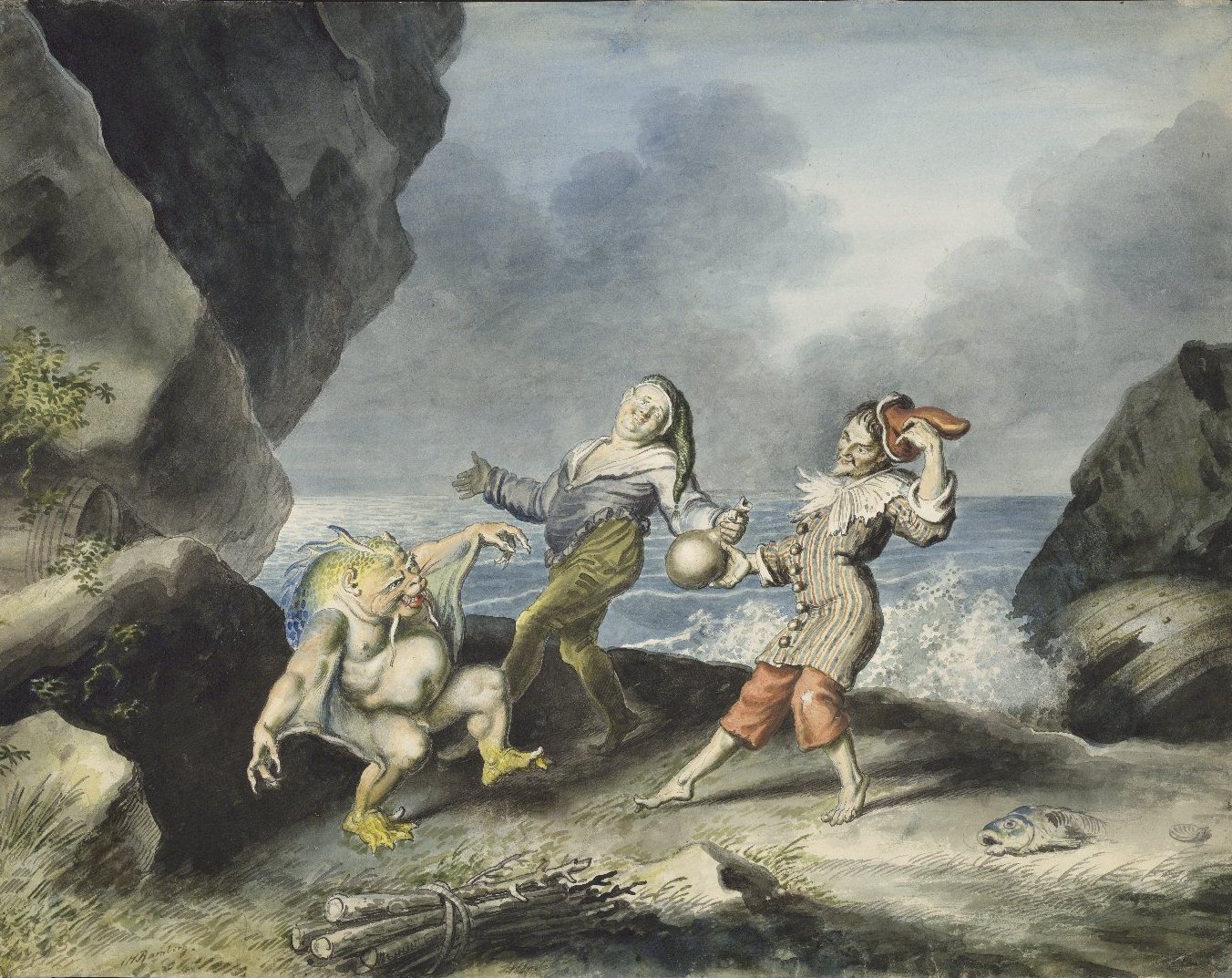I suppose I’ll start off by saying that The Tempest was a bit of a disappointment to me. Now don’t get me wrong. I love Shakespeare. I think he’s a genius. And The Tempest definitely had it’s moments and beautiful lines (“We are such stuff / As dreams are made on, and our little life / Is rounded with a sleep (IV.i.155-158).” I loved that bit), but I felt that it was quite underdeveloped as far as the characters and the plot goes. Which is fine, I guess, because there are so many other things to consider BECAUSE it’s so mysterious, like different interpretations, symbols, and themes, which Shakespeare did a great job of including in this play.
Maybe my inner social justice advocate, but the interpretation that Caliban and the island is being colonized is probably my favourite. Especially (as shown in Robert’s lecture) when we look at the different ways Caliban was portrayed, from being a fishy looking (and smelling) monster, to something that looks like a gorilla of sorts, to an unmistakenably African portrayal. The fact that Shakespeare even attempted to allude to colonialism in this way is pretty amazing.
At the end of The Tempest, Prospero dismisses Caliban, telling him to clean up his cell. But he was never formally released like Ariel was, despite the fact that they were both enslaved by Prospero. It’s important to note that Caliban’s final words on stage was an apology to Prospero for trying to leave him for Trinculo and Stephano, which reminds me a lot of the cycle of abuse, or battered woman syndrome in cases of spousal abuse. Caliban and Prospero are obviously not married, but it makes me think about how a person in an abusive relationship often apologizes to their abuser and always returns to them in the end. Which makes me think that, despite the fact that Caliban was technically relieved of his post as Prospero’s wood gatherer and that he got his island back, it’s hard to say that Caliban is completely liberated. Abuse leaves its marks on the victim the same way that colonization leaves its marks on a nation. The culture, the language, the people of a colonized nation are never the same, even after the colonizer has left. Caliban had clearly been affected by Prospero’s colonization of him, with the way he apologized to Prospero and with the fact that he seemed completely okay with submitting to Trinculo and Stephano, even doing it willingly. It’s just interesting to see the parallels between Caliban and colonization, because of the historical significance, for one thing. Also, though, because it’s an interesting thing that Shakespeare chose to emphasize in his last play. Whether he did so in criticism of his country or simply as an observation can be another debate.
(Sidebar: I wrote this post waaay late, I realize. I didn’t know that it had to be BEFORE my presentation. Oops. Now I know.)

Better late than never! I really like how you’ve pointed out that while Ariel is directly released in the play, Caliban isn’t. I had noticed that, but the interpretation you give to it here is very interesting–that we might think of him as not really released in a deep way.
Though having just read a bunch of essays on Shakespeare, I now wonder if we might also think of Ariel as “colonized,” and if so, why he wouldn’t also be so marked by it as Caliban (i.e., he is released at the end).
On another note, can you activate the plugin that allows those who comment to check a box to get an email if someone replies? When you’re logged into your site, go to “plugins” on the left menu, then find “subscribe to comments” and click “activate” next to it. Thanks!
I think that comparing Ariel and Caliban would be a really interesting task, because while they’re both Propero’s servants, Ariel goes about it in a very different way. I think the difference between Ariel and Caliban in the colonization aspect may be that Ariel is promised release, while Caliban seems to be enslaved indefinitely. In other words, it seems like Ariel is working on a contract basis, while Caliban is more like a slave in a traditional sense. Ariel is, after all, indebted to Prospero while it seems that Caliban is simply enslaved for the fact that he’s deemed to be needing being tamed. And I guess the other part of it would be that Ariel is actually useful to Prospero because he can do magic and whatnot while it’s unclear whether Caliban has any magical powers.
So is Ariel colonized? I’m not sure, but definitely not in the same way Caliban is. “Colonizing” generally comes with a negative connotation and Ariel didn’t seem to be mistreated by Prospero. And while Caliban seems to have been affected by being under Prospero’s thumb for so long (e.g., his submissiveness, how he displays traits of a victim of abuse, etc), I don’t really see any evidence of Ariel being affected in that way. Maybe, again, it’s the fact that Ariel is promised the prospect of release, while Caliban would be trapped in his role for the rest of his life, for all he knew. Maybe it’s just the way that Prospero treats Ariel much more kindly than Caliban – probably because Ariel is useful to him.
(Tangent: We don’t know if Caliban has any magical capabilities. With his mother being a witch, it’s not unlikely. But Prospero has trapped him in the role of wood-fetcher, leaving him no room to explore that potential. So Prospero has stunted him in that way as well! And, maybe, that’s another potential explanation for the ending of Greenaway’s film, when Caliban steals the last book. He did so in hopes of fulfilling his innate abilities for magic.)
This is getting to be really long, but you really got me thinking there, so thanks!
I’ve activated the plugin! Thanks for reminding me.